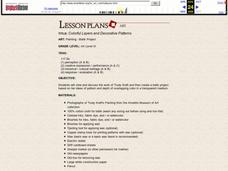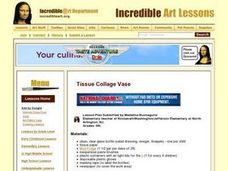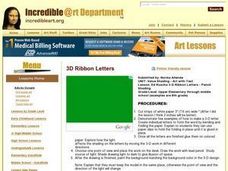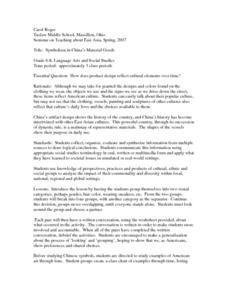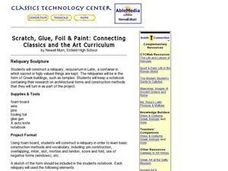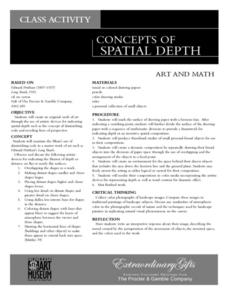Overlapping Teacher Resources
Hi, What do you want to do?
Find Overlapping lesson plans and worksheets
Showing 262 resources
Curated OER
Blick Liquid Watercolor
Students explore the use of watercolors in the making of paintings that incorporate the use of shapes and overlapping them into new ones. The skills of using positive and negative space is strengthened as they are applied in these...
Curated OER
It's A Jungle Out There -Tempera
Sixth graders explore master paintings by Rousseau. They explain how the artist creates depth by overlapping images. They design and create an "imaginary" tropical landscape for a tempera painting.
Curated OER
Paper Batik Flowers
Students create original works of floral art in this three-day Art lesson plan for the upper-elementary classroom. Included with the lesson plan is a picture example of the finished project and tips on how to create the art using black...
Curated OER
COLORFUL LAYERS AND DECORATIVE PATTERNS
Students view and discuss the work of Trudy Kraft and then create a batik project based on her ideas of pattern and depth of overlapping color in a transparent medium.
Curated OER
Screen printing - Positive-Negative shape - Paper stencils
Students explore materials and experiment with stencil process. Students study positive verses negative shape. They experiment with color planning and learn what happens when colors overlap. They work with personal symbols and/or...
Curated OER
Color Mix Up
For this art worksheet, students use the template of shapes and paint the colors as directed with water colors. Students allow the paints to dry before applying the second overlapping color. This worksheet is geared to the adults who...
Curated OER
Tissue Collage Vase
Fifth graders create a collage vase with tissue paper. Using the vase, they cover the material with tissue overlapping with other pieces. They use Mod Podge to get the wrinkled look of the tissue paper and make three dimensional...
Curated OER
Yellow Days: Studying Vincent van Gogh's Painting
Students revisit the color yellow and are introduced to van Gogh, the painter. In this visual arts lesson, students study Vincent van Gogh's painting "Sunflowers" and identify the color yellow. Students create their own interpretation of...
Curated OER
Romare Bearden Collage
The students study collage as it is used in works of art. They create a collage based on a masterpiece. They critique student art work and research the work of Romare Bearden.
Curated OER
Construction Paper Straight Lines
Students actively identify types of line in the environment. They accurately demonstrate an understanding of how straight lines can be used in art. They learn a little about how artist get ideas and practice their skills in gluing.
Curated OER
Starch lines - manipulatives
Students actively explore lines in art, and intuitively create an art object using an unusual media.
Curated OER
Very Hungry Caterpillar - Tissue College
Pupils create tissue collages using paints, tissue paper, and glue in this cross-curricular art/literature lesson based upon the artwork of Eric Carle. Emphasis is placed upon the term collage and practicing collaging techniques.
Curated OER
Cut Up Painting
Learners work on color planning and painting skills and reinforce principles of design. They alter a work of art to create a low relief assemblage.
Curated OER
Composition With Red Hat
Learners create a work of art that includes a red hat, either as a focal point or as an accent in the picture. The picture could be in color or black and white with the hat in red and they choose the medium that they want to use.
Curated OER
Faith Ringgold and Tar Beach
Learners read the book, "Tar Beach," and examine the artist's use of fabric as an art medium. They each create a building and a picture of themselves flying, and a section of the fabric border to develop a class quilt.
Curated OER
Canada Arrives in a Splash of Color
Young scholars investigate social and political issues surrounding founding of Canada and compare their relevance to Canada today, interpret art works representing Canada's past identity and compare that identity to how Canada is...
Curated OER
Showing Depth
Fourth graders examine and demonstrate how to create a middle ground, background, and foreground on a picture or work of art. They identify middle ground, background, and foreground on Michael Sowa's works of art, then create their own...
Curated OER
3-D Ribbon Letters - Pencil Shading
Students examine the art of Edward Ruscha and make a three-dimensional model of a single word. They explore shading and value, and create a drawing of the model. They render ribbon strip letters in varied values to show 3-D quality.
Curated OER
Contour Hand Gestures with Text
Students examine different types of hand drawings. They create their own 3-D contour drawings. They also discuss the use of symbolism in art.
Curated OER
Paper Puppet
Students create hand puppets using basic art supplies, paper cups, cotton balls, and yarn in this 1st and 2nd grade Art lesson. Emphasis is placed on the history of puppets and puppetry. The lesson includes a short vocabulary list.
Curated OER
Symbolism in China's Material Goods
Students make a generalization about the process of 'looking' and 'grouping', hoping to show that we, as Americans, show preferences and shared choices. They study examples of American art through time and create a class chart...
Small Planet Communications
Planet Book Club: Number the Stars
Planning a novel study of Lois Lowry's Number the Stars? Then look no further. A 16-lesson unit guides students through a reading of this awarding-winning novel. Complete with a synopsis of the novel, analysis of its literary themes,...
Curated OER
Scratch, Glue, Foil & Paint: Connecting Classics and the Art Curriculum
Students construct a reliquary using foam board, researching basic Greek and Roman architecture and basic construction methods. They record their research and information in an architectural journal.
Curated OER
Concepts Of Spacial Depth
Students create a dynamic composition by repeatedly drawing found objects using the techniques of perspective, diminishing scale, and receding lines. This lesson includes rubric for assessment.



